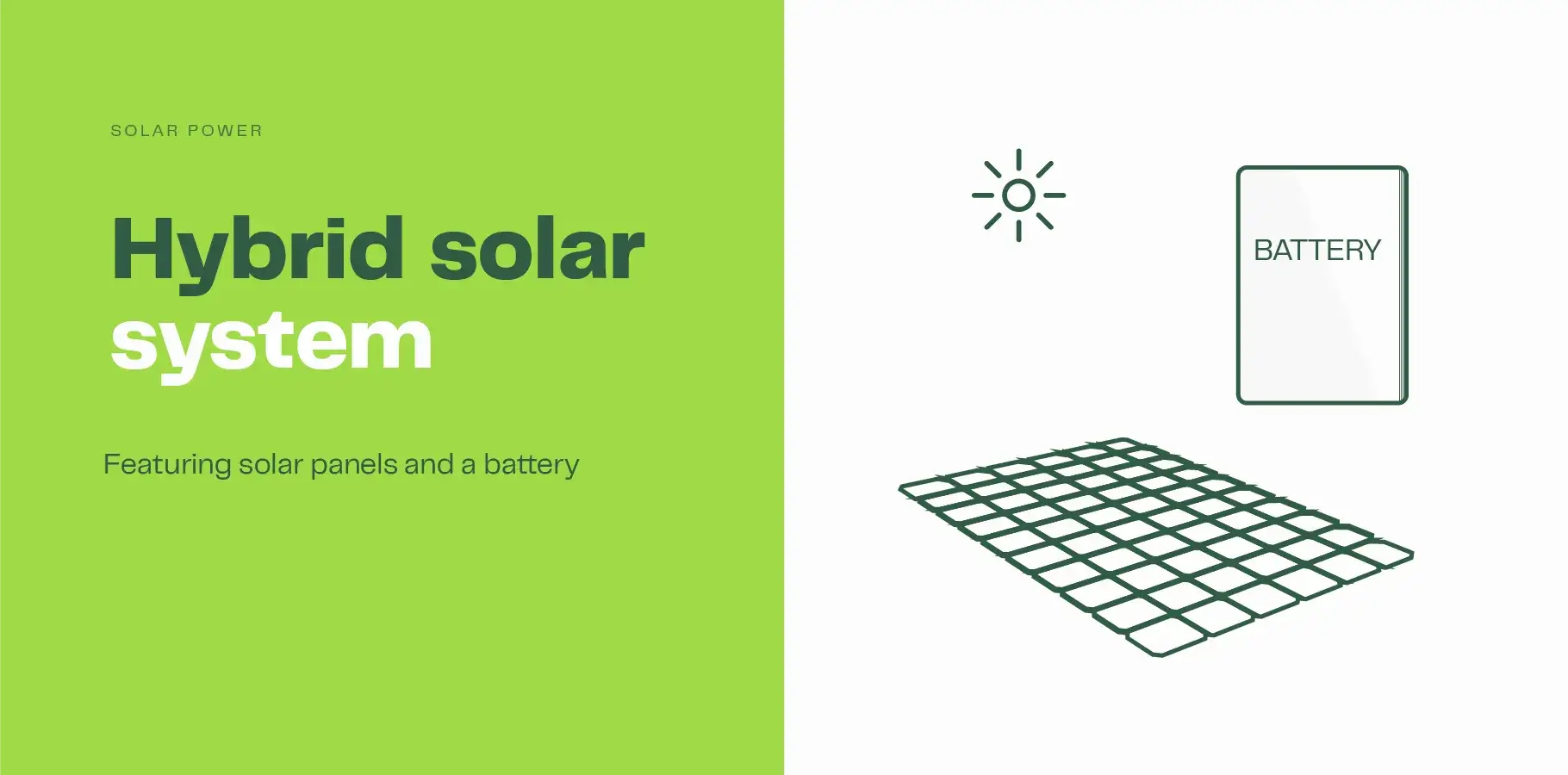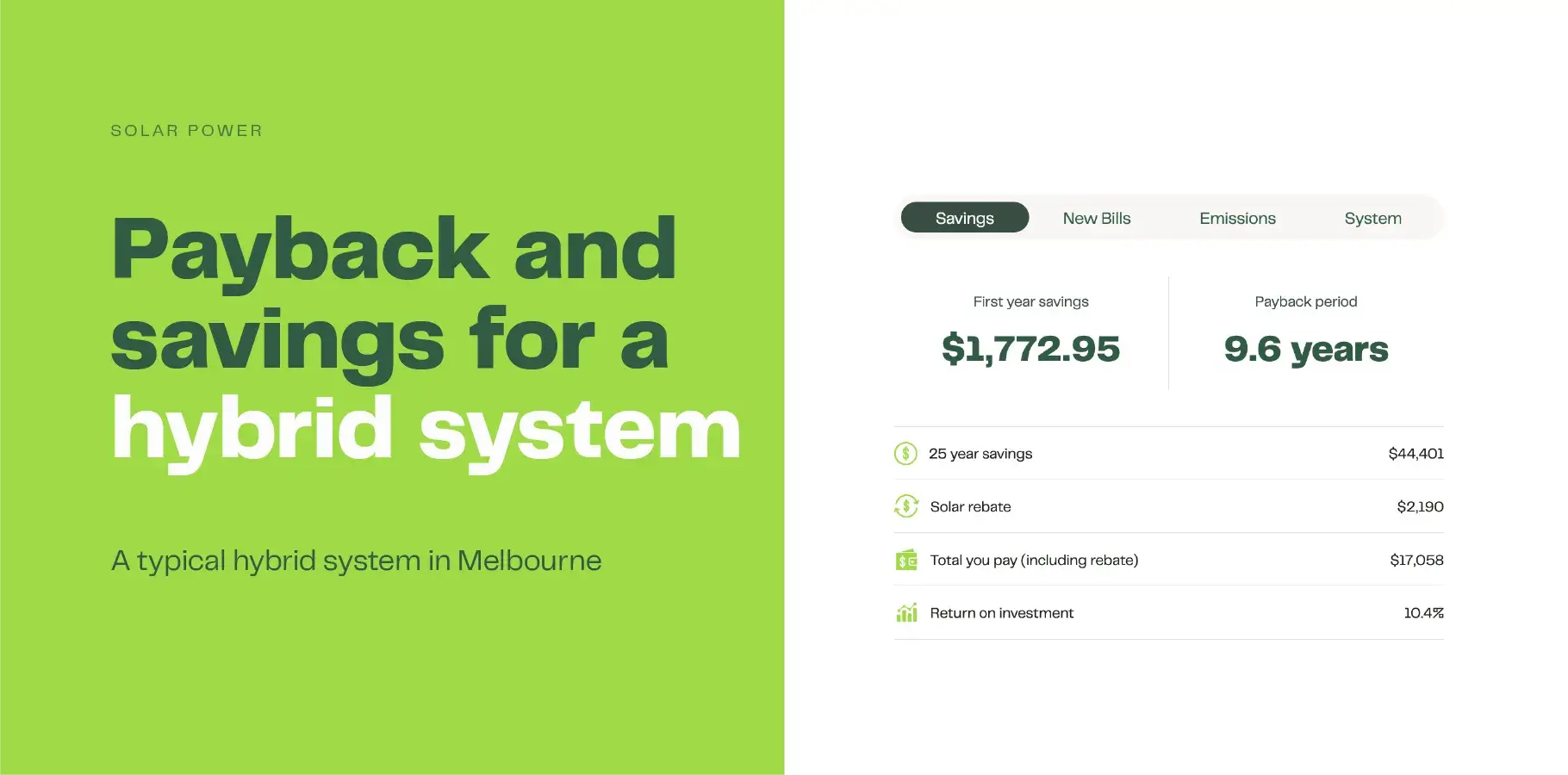Hybrid solar systems: Panels and battery
A guide to hybrid solar systems featuring solar panels and a battery.
A hybrid system is a grid-connected panel and battery system that can store the excess power generated from your panels in a battery for later use.

Hybrid systems provide more energy independence as they can: store solar power and potentially provide power back up.
How do they work?
A hybrid panel and battery system is different from an off-grid system. A hybrid system is a grid-connect system where the grid ultimately serves as your back up power source; it also saves you money as hybrid systems are much cheaper than off-grid systems.
- Panels generate solar power on your rooftop
- Solar energy generated directly powers your working appliances
- Excess power generated from your panels is directed to charge your battery
- Once your battery fully charges, the excess power flows back to the grid
- When the sun isn’t shining, energy stored in your battery will power your appliances
- If your battery is empty and the sun isn’t shining, you purchase power from the grid
Solar panel and battery cost
Solar panel and battery systems cost a lot more than straight-forward solar panel systems. As a guide, a 6.6kW panel system with a 10kWh battery will cost anywhere between $16,000 – $21,000.
This table below compares the cost differences between the systems:
Hybrid system component prices:
| Component | Average cost |
|---|---|
| 6.6kW Solar panels | $6,000 – $8,500 |
| 6.6kW Battery ready system | $7,000 – $9,500 |
| 10kWh Solar battery | $10,000 – $12,000 |
| 6.6kW Hybrid system with 10kWh battery | $16,000 – $21,000 |
| Add solar back-up | $1,500 – $3,500 |
Get more accurate prices and savings results
Our solar calculator allows you to analyse the difference between hybrid systems and solar panels. It will also give you more definitive output, price, savings and payback figures as the results will be specific to your location and electricity consumption habits.
Hybrid system with solar backup
One appeal of panel and battery systems is the ability to use your solar system as a backup power source in the event the grid goes down. Not every panel and battery system is able to provide a backup power source automatically; a special configuration is needed to allow this functionality. The solar backup functionality adds to the cost of a hybrid system by anywhere between $1,500 – $3,500.
Battery ready system
It is possible to buy a battery ready system in preparation for the purchase of a battery in the short to medium-term. A battery ready system comes with a hybrid inverter so that a new battery can fit straight into the system at a later date. Battery ready systems are slightly more expensive, and you should consider your planned purchase date for the battery if it is beyond 2 – 3 years, technological improvements may make your system battery ready system obsolete.
Payback and savings for hybrid systems
A hybrid system will not pay back as quickly as a solar panel system due to the high cost of batteries. Payback and savings figures can differ significantly depending on your electricity consumption habits. Consider that you may be able to payback a panel and battery system within ten years, but by this time, you will also need to buy new batteries. While your panels are likely to continue to generate power for 25 years, your batteries may only last between 7 – 10 years.
The image below shows savings and payback results from our calculator for a 6.6kW system with a 10kWh battery in Melbourne:

Compare calculator results with a solar panel system
It’s also worth comparing the payback and savings of a solar panel system vs a hybrid system. Depending on your circumstances, a panel system may payback within 5 – 6 years.
Do I need a hybrid system?
Installing a hybrid system in favour of a solar panel system is likely to be a decision based upon your desire for energy independence and minimisation of grid electricity. It is likely not an economic decision unless you are a very high power user that uses power during peak periods.
Seek a quality installation
If you do go down the hybrid path, this is not the time to skimp on costs. Ensure you select good quality components and a reputable solar installer company to perform a quality installation.

Are you ready for the benefits of solar?
Get 3 free quotes and start your journey towards making the switch.
Get free quotes